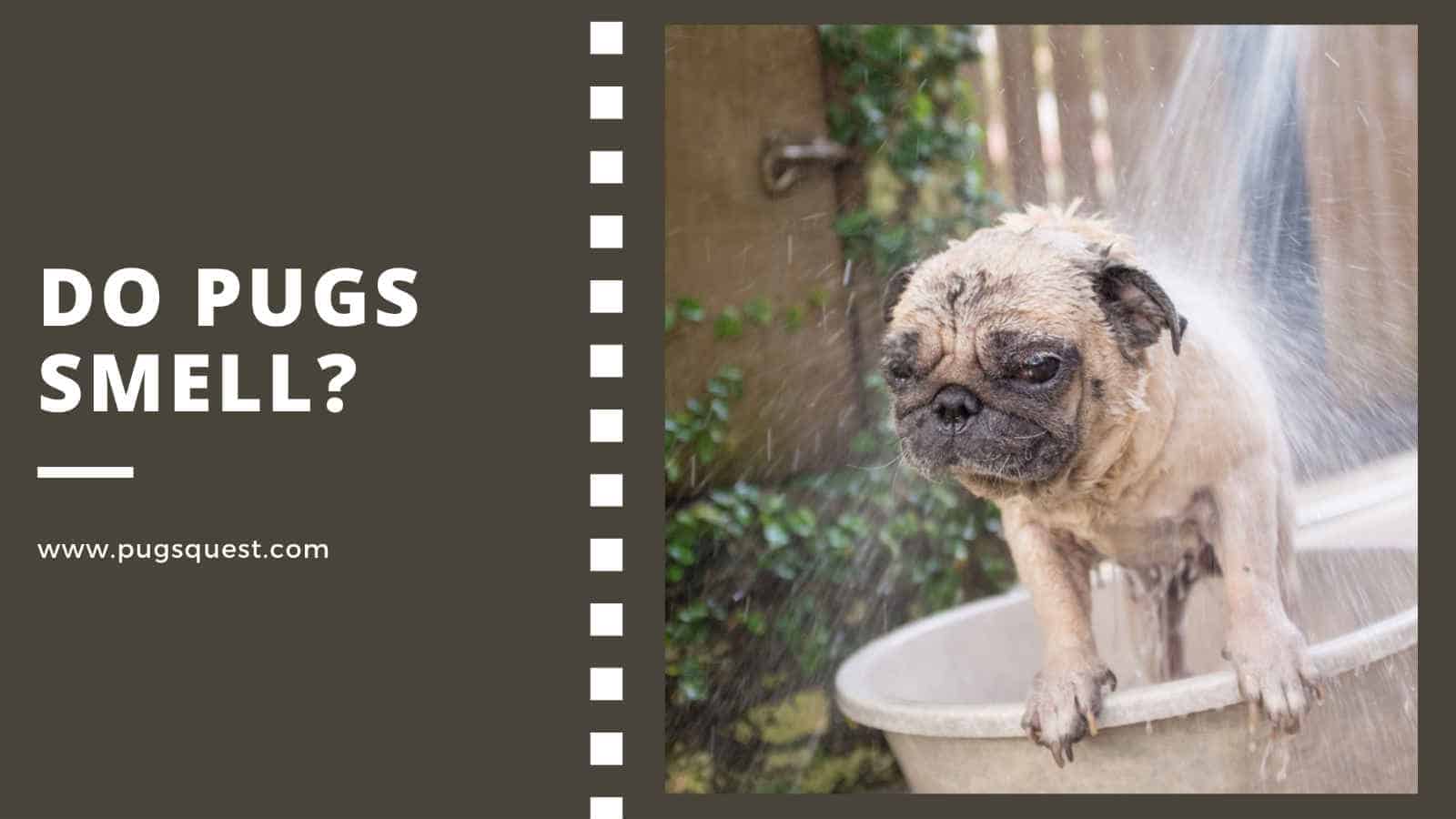
I don’t want a case of the stinks getting in the way of you and your pet. I’m going to settle the score.
Do Pugs smell?
How whiffy is too whiffy?
And what can you do to keep your pooch fresh and smelling like roses?
Do Pugs Smell?
Yes. Pugs do smell. There’s no getting around it. All dogs give off an odor, and Pugs are known for their pungent aromas.
But your Pug doesn’t need to stink 24/7. By taking good care of your dog’s hygiene you’ll avoid putrid whiffs and keep those doggy scents on the milder side.
Most Pug owners will experience some less than pleasant smells emanating from their Pug on occasion. In just a moment, I’ll discuss some common causes of malodor and what you can do to keep the smells at bay.
But first, let’s describe those stinks!
Common Pug odors include:
- A smelly head or face
- Seriously bad breath
- All-over body odor
Why Do Pugs Stink?
There are many reasons why your Pug might smell from time to time. Everything from sweat to dirt, to infection. Let’s take a look at some common causes of malodor.
1. Wrinkles
Your Pug’s wrinkles are one of the most common causes of smelliness. Even if you wipe your Pug’s folds regularly, it’s easy for food and daily grime to get lodged in their wrinkles. And guess what, that causes bad smells.
Skin folds might be cute but they are also breeding grounds for yeast and bacteria. If your Pug is seriously smelly or scratching their face more than usual, the chances are they have developed a yeast-based infection.
2. Bad Breath
Just like your teenage son, your Pug might have bad breath. Just like humans, Pugs need regular dental brushing. If not, expect a serious case of bad breath (halitosis).
But, all jokes aside, bad breath could also point to something more serious.
If your Pug’s bad breath persists despite brushing, this could be a sign of tooth decay or gum disease, in which case I advise that you visit your vet as soon as possible.
3. Anal Glands
You might have heard some Pug parents reporting a fishy odor coming from their Pug. This is not uncommon. The smell is produced in the dog’s anal sacs – the glands secrete oils that act as your Pug’s scent markers.
If the smell persists, however, it indicates a case of anal sac disease which must be treated by a professional veterinarian.
4. Infected Ears
Another potential cause of malodor is an ear infection. If your pooch is scratching its ears persistently, ask your vet for an ear checkup.
5. Lack of Grooming
Body odor is not uncommon in dogs. Just like us, they will begin to smell a bit funky if they haven’t washed in a while.
6. Wet Pug
Ever heard of wet dog smell? Your Pug’s body secretes oils that give off a nasty whiff – especially after a walk in the rain.
7. Paws
Keep tabs on your Pug’s paws. This is one of their smelly zones. Your Pug’s paws get the brunt of their activity.
Everywhere they step, bacteria and grime collect in your Pug’s paw pads. With additional sweating factored in, that’s a recipe for some serious smells.
8. Heat cycles
If female Pugs are not spayed, they will go through heat cycles.
It is very common for female Pugs to give off a pungent and distinctive smell at this time. This is because she is producing lots of body fluids, blood, and endometrial tissue.
Making Your Pugs Smell Good Again
Okay. So Pugs can be kinda’ smelly. But there’s no need to despair. There are ways to keep those aromas on the milder side of things.
By taking good care of your Pug’s hygiene you’ll improve their health and keep smells at bay.
But what can we do to reduce those toxic odors?
1. Dental hygiene
To prevent halitosis we recommend keeping your Pug’s breath fresh with regular dental hygiene. Aim to brush and floss your Pug’s teeth two or three times a week – every day is even better if you can.
Use a quality doggy toothbrush and paste and offer dental chews to reduce plaque buildup. Not only will this keep their breath fresh, but you’ll also be reducing the risk of gum disease or tooth infections in the future.
2. Bath-time
It’s common sense. Body odor? Bathtime.
Bath your Pug on a regular basis to keep smells at bay and wash off some of those stinky oils. Once every three weeks is recommended. Think of it as bonus bonding time with your pooch.
Make sure to give them a thorough rinse with warm water and use a quality doggy shampoo that’s gentle on the skin.
You can find out what to look for in a doggy shampoo here.
If your female Pug is in heat, bathing is a great way to mitigate smells and wash away discharge and body fluids. You can opt to give full or partial baths at this time.
Doggy diapers are another way to contain these fluids, but make sure to change them regularly to achieve the desired effect.
To support your Pug’s bathing routine, try supplementing with a no-rinse, leave-in shampoo, or conditioner. This will give off a pleasant scent and will clean and protect your Pug’s coat between baths.
3. Wrinkles, ears & paws
Stay on top of your Pug’s wrinkles, ears, and paws. Clean your Pug’s wrinkles on a regular basis with warm water or antimicrobial wipes to remove grime and prevent any buildup of bacteria that could lead to a yeast infection.
To prevent ear infections, clean in and around your Pug’s ear flaps regularly. This will prevent bacteria and wax from building up and reduce those nasty smells.
For mild cases, ear cleaning solutions can be found in most pet shops. In more serious cases your vet might recommend a medicated ear rinse containing hydrocortisone to reduce irritation and combat infection.
Wash your Pug’s paws as often as possible. Especially if they’re in and out of the house on a regular basis. Keep nails well-trimmed and wipe down paw pads daily.
Regular paw soaks in a solution of warm water and doggy shampoo will prevent bacterial accumulation and you can also find anti-fungal sprays in most pet shops.
4. Visit a vet
In some situations, the only course of action is to visit your vet. In fact, if you’re ever in doubt about your Pug’s health we recommend contacting your vet for their professional opinion. One such case is for a suspected anal gland disease.
5. Brush, brush, brush
Grooming and brushing isn’t just beauty treatment. It’s an essential part of any doggy hygiene routine.
Brushing your Pug’s fur removes excess debris and allergens that cause odor. Plus it’s a great way to spend quality time with your pal. Aim for regular brushing every day, and after bathtimes.
6. Spring cleaning
How long has it been since you washed your Pug’s bedding? Don’t worry I won’t tell anyone. But if it’s been a long time, this could be the cause of those nasty smells.
If your pooch is laying down and sleeping on a dirty bed every single day, they’re bound to smell a bit funky, right?
Wash all your Pug’s blankets and toys regularly to reduce bacteria and whiffs from lingering on their fur and around your home.
7. Don’t forget about food
You might not think it, but the food your dog eats can affect its odor. You are what you eat, after all. Bad quality Pug food is a recipe for bad smells (and farts to match). A healthy diet will keep your Pug’s digestion working optimally.
Wash Away Pugs Smell
Do Pugs smell? Yes, they do.
Why do Pug’s stink so much? Well, that could be for any number of reasons.
Whilst it’s perfectly normal for dogs to have body odor, it’s important to know when enough’s enough.
When body odor becomes too hard to bear, it’s not only unpleasant but could be a sign of infection or disease.
To keep your pooch happy, healthy, and smelling peachy, maintaining a rigorous hygiene routine is the way to go.
